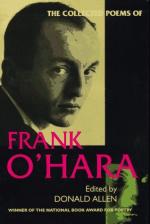|
This section contains 8,854 words (approx. 30 pages at 300 words per page) |

|
SOURCE: Crain, Caleb. “Frank O'Hara's ‘Fired’ Self.” American Literary History 9, no. 2 (summer 1997): 287-308.
In the following essay, Crain utilizes the work of child psychiatrist D. W. Winnicott in order to explicate stylistic aspects of O'Hara's poetry as well as his poetic theory of Personism.
Inasmuch as the soul is present, there will be power not confident but agent.
—Ralph Waldo Emerson, “Self-Reliance”
A generation ago, gay male poets were supposed to be meek and ethereal. Frank O'Hara was not. O'Hara was aggressively present in his poems; he aspired to “the immediacy of a bad movie” (Collected 231). When David Bergman wrote an essay about “the egolessness of the gay male poet,” he was forced to omit O'Hara as the exception that proved his rule (47). As O'Hara's more diffident friend John Ashbery wrote, “One frequently feels that the poet [O'Hara] is trying on various pairs of brass knuckles until he...
|
This section contains 8,854 words (approx. 30 pages at 300 words per page) |

|


